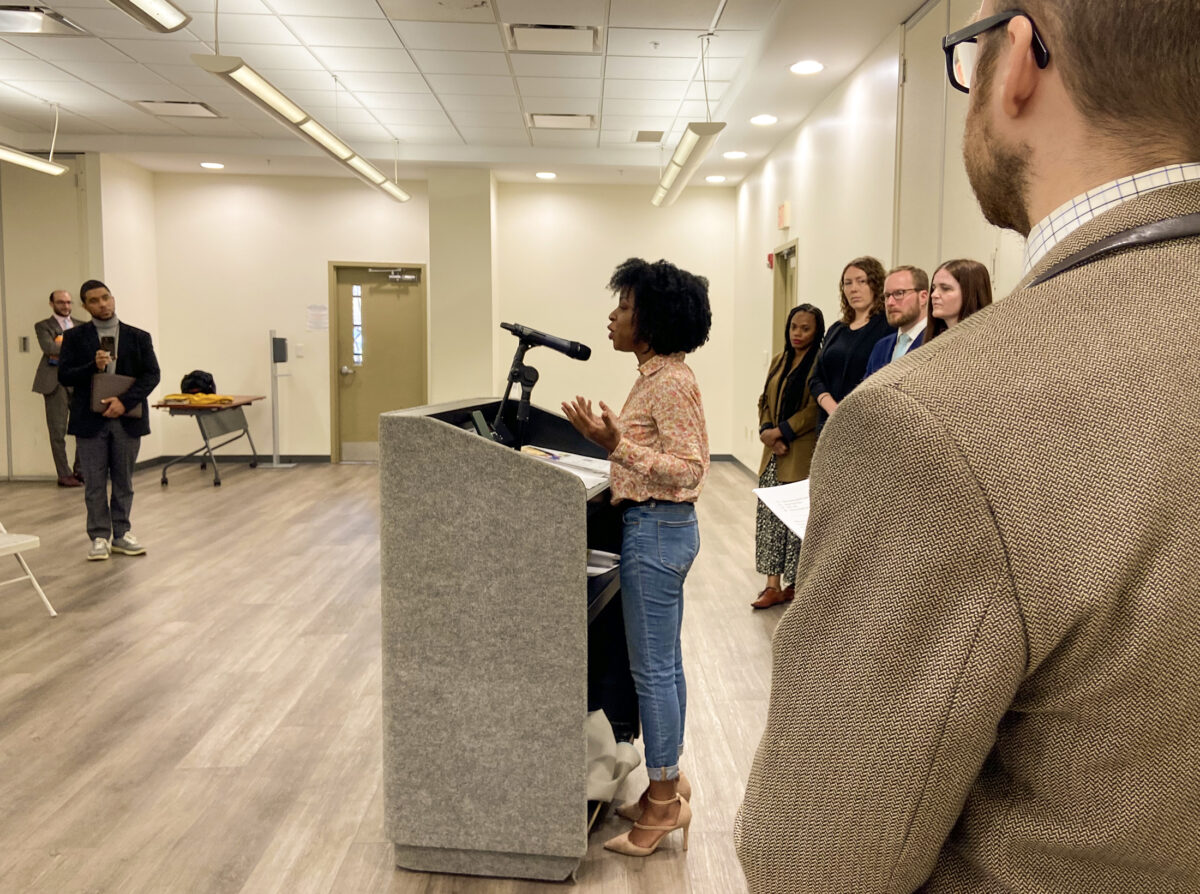At one point during a news conference addressing the threat of “bomb trains” such as the one that derailed and spilled toxic chemicals in East Palestine, Ohio, earlier this year, U.S. Rep. Summer Lee paused to consider the impact such an event would have in Pittsburgh.
It wasn’t a crazy notion. The train’s route ran directly through the city.
The 1-mile “blast zone” in Pittsburgh could potentially impact more than 170,000 residents and workers and affect hospitals, museums and stadiums, said Lee, a Democrat who represents the state’s 12th District. Small businesses could be shut down for months; property values would plummet.
“Had the catastrophe happened here, there would be no doubt the bomb train would have resulted in casualties,” she said. “The devastation in our communities would be unimaginable.”
To underscore the reality of the threat, she noted that a train operated by Norfolk Southern — the railroad company responsible for the East Palestine disaster — derailed Saturday on the city’s West End. Fortunately, that incident involved five empty cars and resulted in no injuries.
Tuesday’s gathering of elected and environmental leaders took place at the Kingsley Center in Larimer, less than 500 feet from tracks that carry Norfolk Southern trains — a fact pointed out by at least two of the speakers.
They all urged tighter regulation of the railroad industry and called for the passage of rail safety legislation in the U.S. House. One bill, called the DERAIL Act, has been introduced by Reps. Chris Deluzio, a Democrat from Pennsylvania’s 17th district, and Rep. Ro Khanna, a California Democrat. The first rail safety legislation introduced after the East Palestine derailment, the act strengthens the definition of a high-hazard flammable train to include more hazardous materials. It also make more trains subject to stronger safety requirements.
A bill in the U.S. Senate, called the Railway Safety Act and introduced by a number of members, including Pennsylvania Democrats John Fetterman and Bob Casey, covers more topics of rail safety and institutes a two-person minimum staffing rule on all trains. This bill has the support of Ohio Gov. Mike Dewine. Deluzio has introduced a House version of this bill.
“Is passage of the DERAIL Act possible in a divided Congress?” one reporter asked.
Lee, a co-sponsor of the legislation, suggested bipartisan support does exist, especially for some aspects of the bi, such as a closer inspection of braking systems and mandating two-man crews on trains.
Each year, 1,700 trains derail in the United States, Lee said. That number has risen more than 27% in the past decade. At the heart of this problem, all speakers argued, is greed.
Railroad companies “always put profit before safety,” Lee said. The East Palestine derailment “is one of the more horrifying examples of it.”
Democratic state Sen. Lindsey Williams, who represents the 38th District in Allegheny County, recalled an exchange she had with Alan Shaw, the president and CEO of the Norfolk Southern Corp., during a state Senate committee hearing. She asked him whether a railroad employee has the authority, without permission, to slow down or stop a train the employee deems unsafe.
“He was unable to answer that question,” Williams said. “The focus is on moving trains, not moving them safely.”
She said she’s co-sponsoring legislation on the state level requiring all trains to have at least two-member crews. In addition, she’s working with the railroads to ensure that first responders have access to the information they need to react quickly and safely to future derailments.
Democratic state Rep. Sara Innamorato from the 21st District joined in the call to pass federal legislation. “We need regulations so families and municipalities stop having to foot the bill” when catastrophes like the East Palestine derailment strike.
Much of the discussion during the news conference concerned broader issues involving the health of communities near major industries. Lee used the term “environmental racism” and noted that many of these communities are black and brown, but not all. Some, like East Palestine, are mostly white. What they all have in common is that they are poor and bear the brunt of environmental degradation caused by industry.
Residents living next to industrial sites “consume toxic air and water; they lack healthy food; they suffer from heart disease, asthma, COPD,” said NaTisha Washington, environmental justice organizer for 412 Justice. “Doctors tell them, ‘You’ll have to move if you really want to live a healthy life.’”
The issue of environmental justice is complicated by the fact that many of these communities and their residents have become economically dependent on the industry that’s doing them harm.
As an example, she cited Clairton, home of U.S. Steel’s Clairton Coke Works, one of the county’s largest polluters.
“There are a lot of workers who have cancer and other health effects, and they will not blame it on U.S. Steel because they want to have jobs, they want their children to have jobs,” Washington said. “They want their communities to not suffer any more than they already have. They say, ‘What are we supposed to do if you shut it down?’”
Washington advocates workforce development and finding ways for the communities to transition from their reliance on heavy industry to green jobs.
Steve is a photojournalist and writer for the Pittsburgh Post-Gazette, but he is currently on strike and working as a Union Progress co-editor. Reach him at smellon@unionprogress.com.



